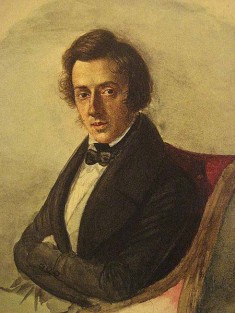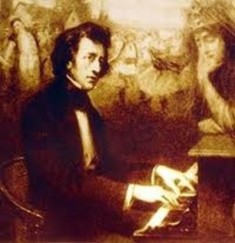| Frédéric Chopin | |
|---|---|
 |
|
| Composer | |
| Born | Feb. 22, 1810 |
| Died | Mar. 1, 1810 |
| Nationality | Poser |
Frédéric Chopin is widely considered to be one of the greatest composers in history. As a child prodigy, Chopin grew into a brilliant piano composer whose works still inspire musicians and lovers of music today. His ability to combine classical music with folk styles was certainly original and highly innovative.
Chopin’s Early Years
Frédéric Chopin was born in Poland on February 22, 1810, but his official birth date is listed as March 1, 1810. His father moved the family to Warsaw to take up a job teaching French. Chopin’s father played the flute and the violin and his mother played the piano. Such an early exposure to music started the young Chopin on the path to learning the basics of how to play.
His mother was his first piano teacher and Chopin would also study formally under a music tutor from 1816 to 1821. The tutor was a very well-regarded instructor named Wojciech Żywny. At the young age of seven, Chopin composed two Polonaises, one in G minor and one in B-flat major. A third work, a Polonaises in A-flat major, was dedicated to Zywny and this is one of the earliest surviving works of Chopin.
Educational Years
In 1826, Chopin began a three-year course in music study at the prestigious Warsaw Conservatory. He studied under the tutelage of Józef Elsner. Documents from the institution dating back to 1829 noted that Chopin was showing a level of skill and brilliance that led to him being regarded as a musical genius.
Chopin also began playing for the public during this time period. Specifically, he was playing in concert halls and even salons. He even played to Tsar Alexander I who was traveling through Warsaw at the time.
Travels and Immigration
Chopin expanded his life experiences and musical pursuits during years spent traveling. In particular, he traveled to Germany and to Paris. In fact, after arriving in Paris in 1831, he never did return to Poland. He considered the move to Paris as one of the very best things he did in his life.
There was a large number of artists and musicians thriving in Paris at the time and Chopin’s celebrity grew. He earned a substantial living teaching the piano to the affluent and wealthy. His teaching duties did not take away from his ability to compose music, which was likely his strongest passion in life.
Chopin’s Dislike of Concerts
 Chopin was not someone who played much in public. He was known to play for aristocrats and in small salons for other members of high society. Chopin also played an annual concert at the Salle Pleyel, but that was about the extent of his public playing appearances.
Chopin was not someone who played much in public. He was known to play for aristocrats and in small salons for other members of high society. Chopin also played an annual concert at the Salle Pleyel, but that was about the extent of his public playing appearances.
There are a few reasons why Chopin did not perform a great many concerts. One reason was he did not like doing them at all. The other was his ill health made it difficult to travel, which is why he spent the bulk of his life in Paris. Lastly, Chopin had become a very wealthy man thanks to his private teaching services. Unlike other musicians, Chopin really did not need the income. In a sense, the lack of travel and concert performances gave him an adequate amount of time to compose his various works.
Great Works and Compositions
Roughly 230 compositions created by Chopin exist. The ones that have been lost are those he composed during his early childhood. The works that do exist are almost all piano solos. A few piano concertos and chamber music selections exist, but they are the exception and not indicative of all the different works he created.
Among his most well known works are Revolutionary Étude, the Minute Waltz, the Funeral March Sonata No. 2, and contributions to Cello Sonata in G Minor.
Death and Legacy
Upon battling illnesses for many years, Frédéric Chopin passed away on October 17, 1849. The official cause of death was tuberculosis.
Chopin requested that after his death, all his manuscripts be destroyed. The musical executor of the estate, Julian Fontana, was able to salvage 23 compositions and they were used in opus numbers 66–73 and they were published in 1855.